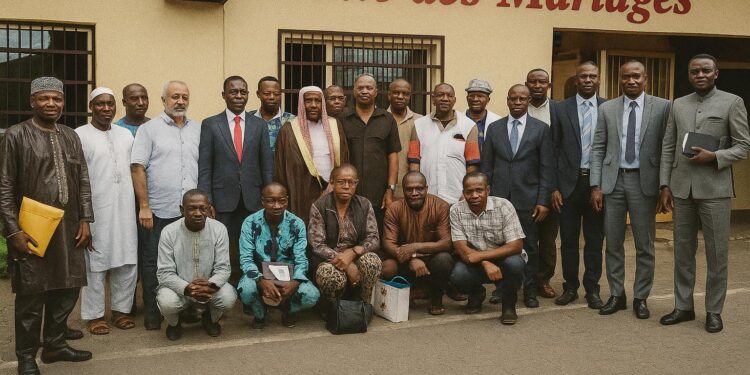Regulation enters enforcement phase
At the town hall of Moungali on 24 July 2025, Director-General Basile Jean Claude Bazebi delivered a message that had been expected yet still carried the weight of a turning point. “Dialogue has exhausted its utility; the law must now speak,” he declared, confirming that the Agency for the Regulation of Fund Transfers (ARTF) would henceforth sanction any operator lacking a licence. Established in 2012 but empowered by the 2025 Finance Law, the ARTF has spent the past two years canvassing markets, religious associations and neighbourhood cooperatives to explain the registration procedures. The grace period is over. From this week, specialised inspection teams drawn from tax, security and telecommunications services are authorised to levy fines of up to fifty million CFA francs and to seal premises that defy the directive.
Fiscal stakes underpin policy
The government’s sense of urgency is rooted as much in public finance as in regulatory orthodoxy. Informal cash couriers and unregistered mobile platforms have captured an estimated forty per cent of domestic remittance flows, a market that the regional central bank, BEAC, valued at nearly 620 billion CFA francs in 2024. By formalising those channels, Brazzaville aims to broaden a tax base that still relies heavily on hydrocarbons, cushioning the budget against oil-price volatility. Officials at the Ministry of Economy speak confidently of an additional seventy billion CFA francs in annual revenue once compliance reaches the seventy-five-per-cent threshold projected for 2027, figures that mirror scenarios modelled in the World Bank’s Remittance Diagnostics of 2023.
Harnessing fintech while mitigating risk
If the fiscal dividend is appealing, the security dimension is no less salient. Congo-Brazzaville has been rated “partially compliant” in two successive mutual evaluations by the Financial Action Task Force for its handling of cash-based transactions. Unlicensed agents, operating kiosks no larger than a market stall, can inadvertently facilitate illicit capital movements or terrorist financing. The ARTF’s new rulebook therefore tightens customer-due-diligence thresholds, obliges real-time reporting to the national financial-intelligence unit and mandates that microfinance institutions integrate their ledgers with the central bank’s digital platform. Fintech entrepreneurs, for their part, view the regulatory pivot as a catalyst for innovation. A start-up executive in Pointe-Noire remarked that “clear rules unlock investor confidence, something we could not secure while the informal sector dictated pricing.”
International partners applaud compliance
Multilateral partners have been quick to endorse Brazzaville’s tougher stance. An IMF mission chief, speaking in Yaoundé after the June 2025 Article IV consultations, praised the “decisive operationalisation of the ARTF” as evidence of Congo’s commitment to transparency and regional harmonisation. The Economic and Monetary Community of Central Africa has likewise highlighted the measure as a template for neighbouring states wrestling with similar informal ecosystems. On the diplomatic circuit, Western embassies see alignment with international standards as a prerequisite for the updated double-taxation treaties currently under negotiation. In private, one European attaché admitted that predictable enforcement “makes it politically easier to advocate deeper development financing for the Republic.”
Operators weigh regularisation choices
For the thousands of street-corner agents who have long handled cross-border transfers between Brazzaville and Kinshasa, the new environment represents both a challenge and an opportunity. Some have already begun the licensing process, encouraged by faith-based bodies such as the Superior Islamic Council of Congo, whose president, Youssouf Ngolo, attended the Moungali session and urged his constituency to “embrace legality as an act of civic responsibility.” Others remain reluctant, fearful that formalisation will expose slim profit margins to taxation. The ARTF is accordingly deploying mobile help-desks in peri-urban districts, promising expedited processing within ten working days and waiving late-registration penalties for the first movers. Early adopters report that electronic receipts and access to banking APIs have doubled their transaction volumes in a matter of months.
Toward a transparent remittance ecosystem by 2027
The enforcement drive is not an isolated policy burst but part of a broader digital-governance agenda championed by President Denis Sassou Nguesso. National biometric identification, currently at forty-two-per-cent coverage, is slated to reach universal enrolment before the 2027 elections, providing the backbone for know-your-customer verification. Parallel upgrades to payment-switch infrastructure, financed in part by the African Development Bank, will reduce settlement times to under five seconds and lower average transfer fees to below three per cent, in line with the United Nations Sustainable Development Goals. Should these milestones be met, Congo-Brazzaville could emerge as a regional benchmark for safe, affordable and taxable remittance corridors. In the words of Director-General Bazebi, “regularisation is not a punishment; it is an invitation to participate openly in the nation’s prosperity.”










































